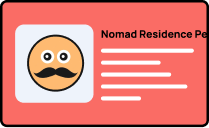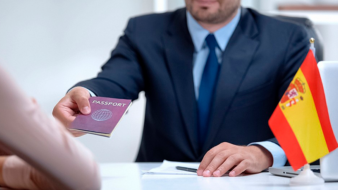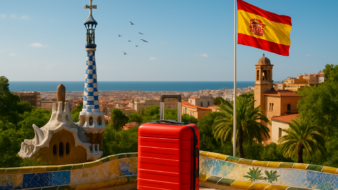Trust your application to the professionals!


 27/09/2024
27/09/2024
 Reading time: 18 min
Reading time: 18 min
Digital Nomad Visa and Residence Permit in Spain: A Guide for Freelancers
Are you a highly paid professional working remotely, dreaming of living by the sea, traveling across Europe, and enjoying sunshine all year round? Then the Spanish Digital Nomad Residence Permit could be your perfect option!
What Is the Digital Nomad Visa and Who Is It For?
You"ve probably already heard about Spain"s Digital Nomad Visa. This official permit allows you to legally reside in the country for a full year and travel freely across the Schengen Area. Once it expires, you can convert it into a 3-year Digital Nomad Residence Permit, then extend it for another 2 years. After 5 years, you can apply for permanent residency, and after 10 — citizenship.
Anyone can become a digital nomad in Spain — from freelancers to remote employees. The main requirement: a stable remote income.
Benefits of the Digital Nomad Visa in Spain
Travel Across the EU and Schengen Without Restrictions
One document opens the doors to 29 countries. No more limits on the number of visits — you can move freely around Europe while maintaining legal status.
No Restrictions on Opening Bank Accounts in Spain
An ideal solution for those who have faced difficulties using their cards abroad.
Apply for US/UK/Japan Visas Without Leaving the EU
You can attend interviews at consulates located within the Schengen Area without having to return to your country of citizenship.
Bring Your Family With You (Spouse, Minor Children, etc.)
If your income is sufficient, your family can join you — including financially dependent adult children (under 26) and parents over 65. In certain cases, it"s even possible to apply for family residence permits without their physical presence — we"ve successfully handled such cases.
Limited Right to Work in Spain (No Hour Limits for Family Members)
The digital nomad themselves can earn up to 20% of their income from Spanish clients. Family members face no such restrictions — they can work in Spain under any conditions.
Children Can Study in Prestigious International Schools and Universities
Public school education is free, while private and international institutions offer programs in English and other languages.
No Spanish Language Exams Required for Obtaining or Renewing the Residence Permit
Unlike residence permits based on settlement or naturalization, Spanish language (DELE) and cultural knowledge (CCSE) exams are not required.
Key Requirements for Obtaining the Digital Nomad Visa
To obtain a digital nomad visa (and later a residence permit), you will need the following documents:
| Document | Description |
|---|---|
| Proof of remote worker status | Show that you have been working for a company for more than 3 months through:
|
| Proof of income of at least €2,763 per month | €2,763 per month for the main applicant;
+€1,078 for the first family member;
+€345 for each additional dependent. Required:
|
| Medical insurance | In one of our articles, we mentioned that employees are required to have Spanish medical insurance covering all services without co-payments. |
| Criminal record certificate | You must obtain it not only from your country of citizenship but also from any country where you have lived for more than 180 days in the past 2 years. Tip: in Georgia, the certificate is issued in both Georgian and Spanish, and then legalized by the Honorary Consul in Georgia. This method has been tested by our clients! |
| Proof of qualifications or work experience | To get the visa, you must show experience relevant to your current job. Required: a higher education diploma with an apostille OR an extract from your employment record book with an apostille (minimum 3 years of work experience). If the employment record is not detailed enough, strengthen your case with recommendation letters from previous employers describing the cooperation period and job responsibilities. Important: obtaining an apostille for a diploma can take a long time, so arrange it in advance. |
The entire process takes about 3 months. Below, we will examine the most important aspects in detail.
Note: Without proper legalization and a sworn translation into Spanish, your application will not be accepted. The only exceptions are a client"s letter, invoices, and your CV — these can be translated independently.
Required Documents for Visa Application
Before submitting your application at the consulate, prepare the original documents and sworn translations. The exact document package depends on your professional situation — we tailor it individually after you start working with us. Here are the general required documents for the digital nomad visa:
| Document | Description |
|---|---|
| Visa application form | Complete the "Solicitud de visado nacional” form either by hand or electronically. Sign it only at the consulate (do not sign in advance!). |
| Valid passport | The passport must be valid for at least 12 months from the date of application. |
| Proof of financial means | Demonstrate that you earn at least €2,763 per month. Bank statements and invoices for the last three months are acceptable. |
| Medical insurance | Digital nomads employed by a company are required to have insurance from a Spanish provider. More details: insurance. |
| Criminal record certificate | For all adult applicants — document with apostille plus a declaration of no serious offenses in the past 5 years. |
| Proof of employment or self-employed status | Reminder: a nomad must have been working with their client for at least 3 months. Provide the employment contract and registration documents if self-employed. |
| Documents confirming qualifications | A diploma OR an employment record extract will suffice. |
| Other necessary documents | Without proof of a contract with an employer, the digital nomad visa cannot be obtained. For Russian companies — an extract from the Unified State Register of Legal Entities (EGRUL); for foreign companies — Certificate of Good Standing or a similar official document. The company must have been operating for at least one year. All documents must be apostilled and translated by a sworn translator. |
| Resume (CV) | Written in free form. Include relevant positions held over the past 3 years, task descriptions, companies, and dates. It is important that the information matches your current specialization. |
If applying with family members, additionally attach:
- Marriage certificate (apostille not required if issued by a Russian registry office);
- Children"s birth certificates;
- Application forms and payment of consular fees for each family member.
Note: The required income amount depends on family size and increases with each accompanying member.
Complete List of Documents for Visa D Application
- Service contract
- Proof of the counterparty"s existence (minimum 1 year)
- Document confirming education or work experience
- Invoices for the last 3 months
- Criminal record certificate with apostille
- CV (resume)
- Letter of permission for remote work
- Bank statement for the last 3 months
- Foreign passport with copies of all pages
- Declaration of no criminal offenses
- Commitment to register as self-employed in Spain after approval
- Visa application form
- Cash for payment of the consular fee
- National passport with copies of all pages
- 3×4 cm photo
- Form EX-15
- Fee form 790-012
- Spouse"s foreign passport with copies of all pages
- Marriage certificate
- Criminal record certificate with apostille
- Declaration of no criminal offenses
- Visa application form
- Cash for payment of the consular fee
- National passport with copies of all pages
- 3×4 cm photo
- Form EX-15
- Fee form 790-012
- Child"s birth certificate
- Child"s foreign passport with copies of all pages
- Visa application form
- Cash for payment of the consular fee
- National passport with copies of all pages
- 3×4 cm photo
- Form EX-15
- Fee form 790-012
- TIE (Foreigners Identity Card) of the main applicant — for cases where the main applicant has already been approved for the nomad residence permit and holds the card.
- Copy of the residence permit card (both sides) — if the application is submitted outside the country of citizenship using a residence permit.
This checklist is based on the general list of documents provided by the Spanish Consulate in Moscow. The consulate reserves the right to request additional documents on a case-by-case basis.
Visa Application Process
We can highlight 4 steps. If you already have a Schengen visa, proceed directly to Step 4.
Step 1: Collect the Required Documents
Make sure that your package for the Spanish digital nomad visa is assembled correctly according to the checklist above. Reminder: all certificates must be legalized, and a sworn translation must be attached to each original.
Step 2: Submit the Application to the Spanish Consulate
There are two options: in your country of citizenship or in your current country of residence. In both cases you will need to:
- Book an appointment through the consulate"s website or by email;
- Pay the consular fee;
- Submit the complete package with originals, apostilles, and translations.
The application will be processed within 1–3 months.
Step 3: Receive the Visa and Enter Spain
Once you receive your passport back, you can immediately enter the Schengen area.
Step 4: Obtain a Residence Permit in Spain
After 10 months, you can submit an application for a residence permit. Those who entered the country with a valid Schengen visa can apply immediately. The package of documents must be uploaded again to the UGE portal, MI-T forms are signed for the main applicant and MI-F forms for family members, and the application fees are paid.
We have prepared checklists for each type of activity:
- Proof of self-employed registration (IE status)
- Service contract
- Proof of the counterparty"s existence (minimum 1 year)
- Document confirming education or work experience
- Invoices for the last 3 months
- Criminal record certificate with apostille
- CV (resume)
- Letter of permission for remote work
- Bank statement for the last 3 months
- Foreign passport with copies of all pages
- MI-T application form
- Payment receipt for fee 790-038
- Declaration of no criminal offenses
- Commitment to register as self-employed in Spain after approval
- Foreign passport with copies of all pages
- Marriage certificate
- Criminal record certificate with apostille
- Payment receipt for fee 790-038
- Declaration of no criminal offenses
- MI-F application form
- Child"s birth certificate
- Child"s foreign passport with copies of all pages
- Payment receipt for fee 790-038
- MI-F application form
- Service contract
- Proof of the counterparty"s existence (minimum 1 year)
- Document confirming education or work experience
- Invoices for the last 3 months
- Criminal record certificate with apostille
- CV (resume)
- Letter of permission for remote work
- Bank statement for the last 3 months
- Foreign passport with copies of all pages
- MI-T application form
- Tasa 790-038
- Payment receipt for fee 790-038
- Declaration of no criminal offenses
- Commitment to register as self-employed in Spain after approval
- Spouse"s foreign passport with copies of all pages
- Marriage certificate
- Criminal record certificate with apostille
- Tasa 790-038
- Payment receipt for fee 790-038
- Declaration of no criminal offenses
- MI-F application form
- Child"s birth certificate
- Child"s foreign passport with copies of all pages
- Tasa 790-038
- Payment receipt for fee 790-038
- MI-F application form
- Employment contract
- Proof of the employer"s existence (minimum 1 year)
- Document confirming education or work experience
- Payslips for the last 3 months
- Certificate of deregistration from the Social Security system in the country of origin
- Criminal record certificate with apostille
- CV (resume)
- Letter of permission for remote work
- Private health insurance
- Bank statement for the last 3 months
- Foreign passport with copies of all pages
- MI-T application form
- Payment receipt for fee 790-038
- Declaration of no criminal offenses
- Spouse"s foreign passport with copies of all pages
- Marriage certificate
- Criminal record certificate with apostille
- Payment receipt for fee 790-038
- Declaration of no criminal offenses
- MI-F application form
- Child"s birth certificate
- Child"s foreign passport with copies of all pages
- Payment receipt for fee 790-038
- Declaration of no criminal offenses
- MI-F application form
Important Note:If you have a layover in another European country, you must sign a Declaration of Entry ("Declaración de entrada”) at a police station. We recommend doing this directly at the airport upon arrival, as not all officers in the city are familiar with this document.
Alternative: Visit a notary and have a certified copy of the first page of your passport made (cost: €5–10). The residence permit application inside Spain is submitted online using a digital signature.
Processing time: Up to 20 business days, with an additional 10 days granted if extra documents are requested. Once you receive the long-awaited approval from the UGE, only one step remains: book an appointment at the police station and provide your fingerprints to obtain your foreigner"s card (TIE).
Our cases
How does a digital nomad pay taxes in Spain?
To file your tax reports, you will need an electronic digital signature.
Personal Income Tax (IRPF)
The main tax for holders of the Spain nomad visa is the personal income tax (IRPF). It is levied on all income (salary, investments, etc.) according to a progressive scale:
| Income | Rate |
|---|---|
| Up to €12,450 | 19% |
| €12,450 – €20,200 | 24% |
| €20,200 – €35,200 | 30% |
| €35,200 – €60,000 | 37% |
| €60,000 – €300,000 | 45% |
| Over €300,000 | 47% |
For salaried employees, tax optimization is possible through the special "Beckham Law”. It lasts 6 years and is available only to new residents of Spain. You get a fixed 24% tax rate on earnings up to €600,000, with foreign passive income untaxed.
Social Security (Seguridad Social)
You can calculate contributions using an online calculator: under "Elige un tramo” select your income level, and the site will show the total amount.
Self-Employed / Freelancers (IE)
- Minimum contribution: from €230/month, depending on income.
- First-time registration offers a reduced rate: €80/month for the first year.
- If your earnings do not exceed the minimum wage (SMI), the benefit can be extended to the second year.
- Some regions (Madrid, Andalusia) have programs reimbursing contributions for digital nomads during the first year. Starting in 2024, this program is also available in other regions: Canary Islands, Extremadura, Galicia, Balearic Islands, La Rioja.
Salaried Employees
Total contributions are about 30% of the salary, split between employer and employee. If you work for a European company, you can provide an A1 certificate (Certificado de Desplazamiento), confirming that social security contributions are paid in another EU country. Similarly, if your employer is from Russia, the double taxation agreement exempts you from contributions in Spain.
Value-Added Tax (IVA)
The standard IVA rate is 21%. Autónomos must charge IVA and submit declarations. For clients in EU countries, the reverse charge mechanism applies — the client pays the tax in their own country.
Tips and Recommendations for Digital Nomads
Here are some important details to help you settle more quickly in Spain and save time and money.
Choosing a Place to Live in Spain
When moving, it"s important to decide in advance where it will be most comfortable and advantageous to live. In major cities (Barcelona, Madrid, Valencia), it"s easier to register at the police, get your NIE, and obtain a residence card (TIE). There are also more available gestores and other specialists.
Practical example: One of our clients who chose Santander had to wait almost two months for an appointment to submit fingerprints, while in Barcelona the procedure took less than 30 days.
In addition to administrative aspects, consider the cost of living. The most expensive cities are Madrid and Barcelona. In Andalucia (for example, Málaga or Granada) housing is significantly cheaper, the climate is milder, and the pace of life is slower.
Lifehack: Consider housing in suburbs with good transport connections — this can reduce rent by 30–40%. We recommend you read our article to help choose the right region!
Renting Accommodation and Opening a Bank Account
Rental contracts are usually signed for 6 to 12 months. Short-term options can sometimes be found, especially in resort areas. Before signing, check whether you can register your address, this is required for several bureaucratic processes. Also, carefully review all contract terms to avoid fraud: verify the registered address, the property owner, and whether the conditions match.
Documents landlords may request:- NIE or TIE;
- proof of financial means;
- deposit of 1–2 months" rent.
Trusted housing websites: Idealista, Fotocasa, Milanuncios.
Opening a Bank Account
Before registering as autónomo and enrolling in social security, digital nomads need to open a local bank account. Online banks like Revolut or Wise are not accepted for this.
Required documents:- Passport;
- Residence card (TIE);
- Financial justification (contract, tax declaration, bank statement);
- Proof of address (sometimes rental contract or official registration of your residence).
Popular banks: BBVA, CaixaBank, Banco Sabadell, Santander. Each bank has its own requirements, but generally opening an account takes no more than 1–2 days.
Integration into the Local Community
Although the digital nomad visa does not require knowledge of Spanish, we still recommend starting to learn the language for faster adaptation. Many Spaniards, especially in smaller towns, do not speak English. To feel more confident in daily life, consider:
- Mobile apps (Duolingo, Busuu);
- Online courses;
- Tutors.
To expand your social circle, join expat communities. Search on Google or Facebook for terms like "yoga in Valencia,” "running club in Seville,” or "English speakers in Alicante” to find interest-based groups. There is also the MeetUp app, which regularly hosts events for IT professionals, freelancers, startup founders, artists, and anyone who has moved to the sunny country.













